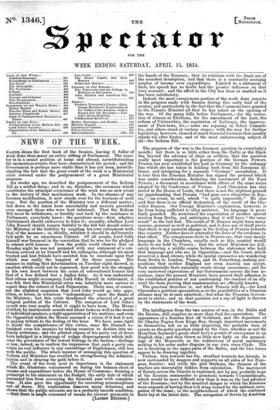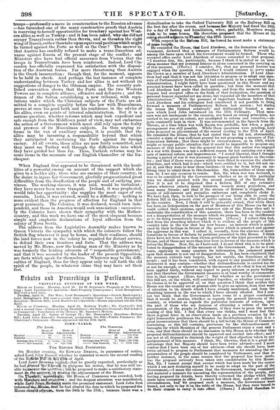The intelligence from the two centres of war, in the
Baltic and the Euxine, still supplies no more than food for expectation. The appearance of a Russian fleet off Gothland, and the departure of Sir Charles Napier from Kioge Bay, though important movements in themselves, tell us as little respecting the probable turn of events as the petty question raised by the Czar, whether or not Sir Hamilton Seymour's goods shall have a permit of conveyance in an English ship ; and they throw as little new light on the proceed- ings of the Muscovite as the rediscovery of naval machinery making to his order under disguise in our own river Clyde. The ice is breaking in the upper parts of the Baltic, and the two forces appear to be drawing together. - Turkey, firm towards her foe, steadfast towards her friends, is now surrounded by dangers and supports on all sides of her Euro- pean frontier; and while the plot thickens,' the chances of the warfare are inscrutably hidden from calculation. The movement of Russia across the Danube is explained, not by any probable hope of the Russian. commander, to penetrate. towards Constantinople, which would be more difficult now than it was on the last advance of the Russians ; but by the manifest danger to which the Russians were exposed; of having their left wing turned by the Military occu- pation of the 6oast ; in the neighbourhood of which the combined fleets lay at the latest date. The occupation of Servia by Austrian
troops—professedly a move in counteraction to the Russian advance —has furnished one of the many constructive proofs that Austria is reserving to herself opportunities for treachery against her West,- ern allies as well as Turkey.: and it has been asked, why-alze didnat occupy Transylvania rathisr than Berrie, and so threaten the right Wing of Russia, rather than take upanequivocalpositiosewhich might be turned against the Porte as well as the Czar? The answer-is, that Austria has candidly refused to make a trans-Danubian ad- vance against Russia at the present stage of the conflict; and Ministers also have had official assurance from Vienna that the troops in Transylvania have been reinforced. Indeed, Lord Cla- rendon has officially expressed his satisfaction with the disposi- tion of the Austrian forces. Far more threatening than Austria is the Greek insurrection; though that, for the moment, appears to be held in check. And perhaps the last instance of complete understanding between Turkey and her allies is not without its suggestions of danger to the Ottoman empire. The recently pub- lished convention shows that the Porte and the two Western Powers are in complete alliance, offensive and defensive ; and the &man of the Sultan establishing a new tribunal, with regu- lations under, which the Christian subjects of the Porte are ad- mitted to a complete equality before the law with Mussulmans, proves at once his good faith and his confidence in the advice of his allies, even on points of internal administration. But it is a serious question, whether reforms which may look expedient and safe enough from the Middlesex point of view, may not embarrass the action of a Government which must still rely upon the fealty and prowess of its Mussulman subjects. In thus urging re- forms in the van of auxiliary armies, it is possible that the allies may be incurring a responsibility beyond that which they anticipated in sustaining the Porte against its foreign enemy. At all events, those allies are now fairly committed, and they must see Turkey well through the difficulties into which they have guided her thus far. Thus Turkish reforms may be- come items in the accounts of our English Chancellor of the Ex- chequer.



























 Previous page
Previous page